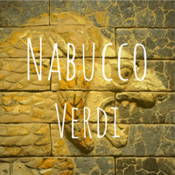
Overview
Synopsis
In Verdi's retelling of the Old Testament stories of King Nebuchadnezzar II's religious conversion, King Nabucco's hubris and ambition almost result in him losing his beloved daughter as well as his kingdom.
With the Assyrian army surrounding Jerusalem, the Israelites fear that their city will be taken. However, they have captured Fenena, Nabucco's daughter and heir, and they know he would not risk her life. They hope to bargain with Nabucco to leave their city in exchange for his daughter's safe return.Nabucco will not be so easily defeated, and ferociously threatens the Israelites. In return, Zaccaria threatens to kill Fenena, but Ismaele, in love with Fenena, disarms Zaccaria and releases Fenena into Nabucco's protection. Nabucco calls for his army to destroy the temple.
Meanwhile, Nabucco's other daughter, Abigaille, has found a document revealing she is not Nabucco's daughter, but the daughter of a slave. A jealous and ambitious woman, Abigaille swears vengeance against Nabucco and Fenena, and determines to put herself on the throne. She spreads a rumor that Nabucco has died in battle, but at the moment she is about to be crowned, Nabucco appears. He furiously proclaims death to all the Hebrews. Only then does Fenena reveal the truth; she is a Hebrew, and will die with them. Nabucco cannot believe this betrayal, and demands she obeys him; he is not just king, he is their god.
For this blasphemy, Nabucco is struck with a thunderbolt and driven mad. Abigaille steals the crown from him, and rules in his place. Nabucco only finds his way back to sanity by asking for mercy from the god of the Israelites. His religious conversion enables him to save Fenena from being executed at Abigaille's order.
Show Information
Context
After the success of Verdi’s first opera, Oberto, La Scala commissioned him to write three more great works, all to be premiered at La Scala. However, with this fantastic opportunity for this young composer, Verdi’s second piece was anything but a success, after which he vowed never to compose again. Luckily, he continued his work and created one of his most famous works; Nabucco, which premiered in 1842.
Based on a combination of biblical stories from the books of Jeremiah, 2 Kings,
to read the context for Nabucco and to unlock other amazing theatre resources!Plot
Act I
In Jerusalem, the Israelites gather together in the Temple of Solomon to pray for help as Nabucco, the King of Babylon, comes to attack their city. Zaccaria, the high priest, enters the Temple with Nabucco’s daughter, Fenena, who has been taken hostage, and assures his people that the Lord will not forsake them ('D'Egitto là sui lidi...Come notte a sol fulgente'). As the crowd leaves, Ismaele, the nephew of the King of Jerusalem, is left alone with the
to read the plot for Nabucco and to unlock other amazing theatre resources!Characters
| Name | Part Size | Gender | Vocal Part |
|---|---|---|---|
|
Lead |
Male |
Baritone |
|
|
Lead |
Female |
Soprano |
|
|
Lead |
Female |
Soprano |
|
|
Supporting |
Male |
Tenor |
|
|
Supporting |
Male |
Bass |
|
|
Featured |
Female |
Soprano |
|
|
Featured |
Male |
Tenor |
|
|
Featured |
Male |
Bass |
|
|
Ensemble |
Either Gender |
Soprano, Mezzo-Soprano, Tenor, Baritone, Bass |
Songs
Overture
Act I
- Chorus and Cavatina: D'Egitto la sui lidi ... Come notte a sol fulgente (Chorus, Zaccaria)
- Recitativo and Trio: Fenena! O mia diletta! (Ismaele, Fenena, Abigaille)
- Chorus: Lo vedeste? (Anna, Zaccaria, Chorus)
- Finale: Viva Nabucco! (Abigaille, Zaccaria, Ismaele, Nabucco, Anna, Fenena, Chorus)
Act II
- Recitativo and Aria: Anch’io dischiuso un giorno .. Salgo gia del trono aurato (Abigaille)
- Prayer: Tu sul labbro (Zaccaria)
- Chorus of Levites: Che si vuol? (Ismaele, Chorus)
- Recitativo and Finale: (Ismaele, Zaccaria, Abdallo, Fenena, High Priest, Abigaille, Nabucco, Anna, Chorus)
Act III
- Chorus: È l’Assiria una regina (Chorus)
- Recitativo: Eccelsa donna (Grand Priest, Abigaille, Nabucco)
- Duet: Donna, chi sei? (Abigaille, Nacbucco)
- Chorus of Hebrew Slaves: Va, pensiero (Chorus)
- Prophecy and Finale: Oh chi piange? (Zaccaria, Chorus)
Act IV
- Recitative and Aria: Dio di Giuda ... O prodi miei seguitemi (Nabucco, Abdallo, Chorus)
- Funeral March, Prayer: Oh dischiuso è il firmamento (Fenena, Zaccaria)
- Finale: Qual grido è questo! (Anna, Fenena, Ismaele, Zaccaria, Nabucco, Abdallo, High Priest, Abigaille, Chorus)
A song with an asterisk (*) before the title indicates a dance number; a character listed in a song with an asterisk (*) by the character's name indicates that the character exclusively serves as a dancer in this song, which is sung by other characters.
Monologues
Scenes
Key Terms
Sorry! We do not currently have terms for this guide.
Videos
Quizzes
Themes, Symbols & Motifs
Sorry! We do not currently have learning modules for this guide.
Quote Analysis
Sorry! We do not currently have learning modules for this guide.
